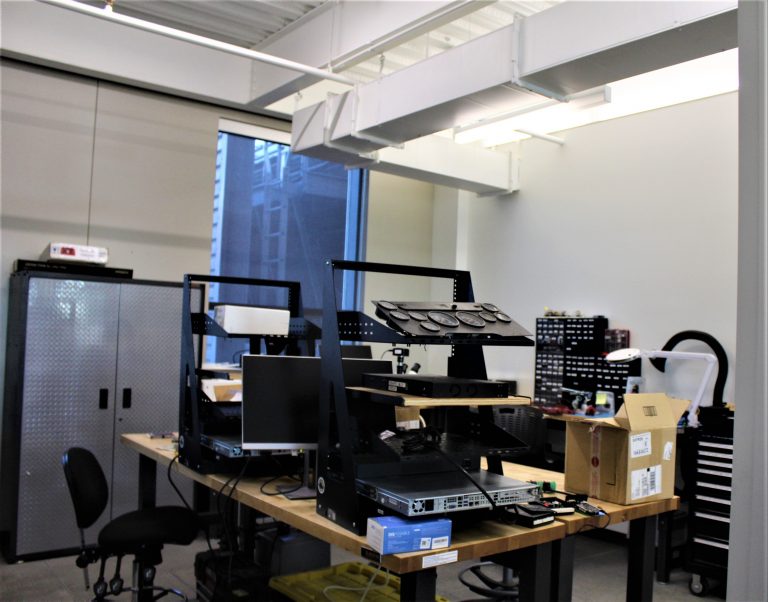We tackle the world's most complex problems.
Systems engineering faculty research in a wide variety of areas, including:
- Systems design/management
- Medical and human-centric systems
- Defense and aerospace
- Decision support
- Analytics and cybersecurity
- Visualization and imaging
- AR/VR simulations
- Energy systems
- Transportation and infrastructure systems
- Water systems
- Operations research
- Project management
- Model-based systems engineering (MBSE)

The Powerhouse Energy Campus is a modern, 100,000 square foot that is one of the largest free-standing energy facilities at any university.
It is recognized nationally and internationally for its interdisciplinary approach and its groundbreaking work on engine technology, electric grids, biofuels, energy policy, human behavior, energy access in the developing world, and energy-focused entrepreneurship.
The Powerhouse Energy Campus serves as the headquarters of Colorado State University’s Energy Institute.
The Bradley Research group, headed by Department Head and Woodward Professor, Dr. Tom Bradley, focuses on using advanced system design tools with experimental validation to advance the state of the art in practical, demonstrable systems.
This group has an active research program that contributes to:
- Sustainable transportation
- Aerospace systems
- Systems engineering
- Energy Systems
The Cale Research Lab, headed by Dr. James Cale, focuses on the modeling, control and design optimization of energy sources and systems.
Some recent research projects include:
- Mathematical modeling and software development for prediction of current harmonics currents in AC and DC distribution systems for comparing energy efficiency of DC vs hybrid AC/DC distribution
- Characterization of magnetic material properties and magnetic equivalent circuit representations of electromechanical devices
- Data analytics and dynamic reliability models for predicting failures in electrical batteries and motors
The Conrad Research Group, headed by Dr. Steven Conrad, focuses on the water-energy nexus, including water-energy interactions, coupled socio-hydrological energy modeling, and decision support for climate change adaptation.
The Daily Research Group, headed by Dr. Jeremy Daily, focuses on heavy vehicle cybersecurity and in-vehicle networking.
The Eftekhari Shahroudi Research group, headed by Dr. Kamran Eftekhari Shahroudi, focuses on anomaly-based controls, diagnostics and prognostics, autonomous UAV-based wildfire detection and monitoring, hydraulic, electric and hybrid aerospace actuation systems, and integration of systems engineering with program management.
The Human Systems Lab headed by Dr. Erika Miller, focuses on integrating humans with complex systems to enhance safety and efficiency.
The Herber Research Group, headed by Dr. Daniel Herber, focuses on design optimization, model-based systems engineering, system architecture synthesis, combined physical and control system design (control co-design), and numerical optimal control concentrated around the development of novel theory and tools for integrated design methods conducive to emerging and dynamic engineering systems. The group works in several engineering application domains, including recent projects in offshore wind/wave energy systems, carbon capture combined with thermal storage and natural gas plants, aero-actuation systems, and thermal management networks for aircraft, and continues to expand.
- Paglioni Research Group | Vincent “Vinnie” Paglioni
The Paglioni Research Group, headed by Vincent “Vinnie” Paglioni, focuses on risk and reliability analysis for complex systems, mostly nuclear power applications.
The Suzanne and Walter Scott, Jr. Bioengineering Building is the cornerstone of Colorado State University’s Walter Scott, Jr. College of Engineering. The state of the art, LEED certified building houses CSU research labs, classes, faculty, and staff.
- Simske Research Group | Steve Simske
The Simske Research Group, headed by Dr. Steve Simske focuses on analytics, intelligent systems, sensing systems, imaging systems, cybersecurity, and Situationally-Aware Collectors of Knowledge (SACKs) in robotics.
Johnson Hall was once the student center at CSU in the early 1940s, but now hosts a range of academic activities including the Institute for Learning and Teaching and the Center for Immersive Scholarship Lab.
The Center for Immersive Scholarship Lab, headed by Dr. Marie Vans, is an XR focused space located in Johnson Hall room 120 where those interested in XR can come to learn, experiment, and play with XR. The CIS Lab’s goal is to be a leader in the realm of XR by focusing on four essential pillars: Research, Immersive Learning, Partnerships, and being an XR Demonstrator.